Feb 24, 2026
Feb 24, 2026
The 1960s – Golden Years – Part 9
Noteworthy Films (Continued)
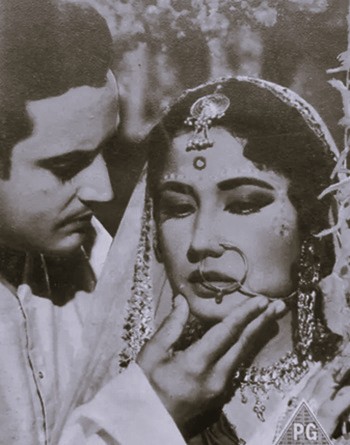 Hrishikesh Mukherjee’s Sanjh Aur Savera, starring Meena Kumari, Guru Dutt, and Mehmood in the main roles, relates the story of an orphan’s travails in her attempt to help her foster father. When the latter’s newly married daughter absconds, she takes her place to prevent her foster father from committing suicide. Meena Kumari carries the narrative with her performance. Guru Dutt’s role, in what was to be his last film, does not give him much scope for histrionics. The surprise package is Mehmood in a serious role, with no horsing around. Playing the part of the heroine’s adopted brother, who persuades the heroine to impersonate the missing bride, and is later accused of eloping with her, Mehmood gives a sterling performance. As usual, Hrishikesh Mukherjee’s direction maintains the pace of the narration. Shankar Jaikishan’s compositions, Yehi Hai Woh Sanjh Aur Savera sung by Mohammed Rafi, Asha Bhosle and Ajahun Na Aye Balamwa sung by Mohammed Rafi, Suman Kalyanpur, were most popular, followed by Chand Kanwal Mere Chand Kanwal, by Suman Kalyanpur, Man Mohan Krishna Murari, by Lata Mangeshkar. Ajahun Na Aye Balamwa, filmed on Mehmood and Shubha Khote, with their well-known antics, seems to have been inserted as a concession to their followers.
Hrishikesh Mukherjee’s Sanjh Aur Savera, starring Meena Kumari, Guru Dutt, and Mehmood in the main roles, relates the story of an orphan’s travails in her attempt to help her foster father. When the latter’s newly married daughter absconds, she takes her place to prevent her foster father from committing suicide. Meena Kumari carries the narrative with her performance. Guru Dutt’s role, in what was to be his last film, does not give him much scope for histrionics. The surprise package is Mehmood in a serious role, with no horsing around. Playing the part of the heroine’s adopted brother, who persuades the heroine to impersonate the missing bride, and is later accused of eloping with her, Mehmood gives a sterling performance. As usual, Hrishikesh Mukherjee’s direction maintains the pace of the narration. Shankar Jaikishan’s compositions, Yehi Hai Woh Sanjh Aur Savera sung by Mohammed Rafi, Asha Bhosle and Ajahun Na Aye Balamwa sung by Mohammed Rafi, Suman Kalyanpur, were most popular, followed by Chand Kanwal Mere Chand Kanwal, by Suman Kalyanpur, Man Mohan Krishna Murari, by Lata Mangeshkar. Ajahun Na Aye Balamwa, filmed on Mehmood and Shubha Khote, with their well-known antics, seems to have been inserted as a concession to their followers.
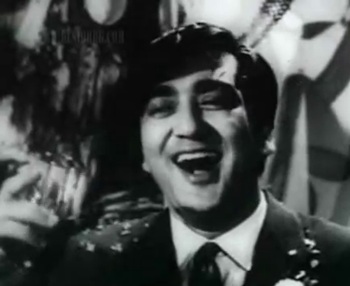 Yadein, produced and directed by Sunil Dutt was a unique film, considered ahead of its time, in which there is only one actor (Sunil Dutt) appearing on screen in the entire film. The only other actor (Nargis) appears as a silhouette in the final scene. The protagonist arrives home and finds that his wife and son are not at home. Assuming that they have left him, he recalls different incidents in their lives, and regrets his mistakes. The film’s narrative proceeds through dialogues and background music composed by Vasant Desai, who also composed two songs sung by Lata Mangeshkar.
Yadein, produced and directed by Sunil Dutt was a unique film, considered ahead of its time, in which there is only one actor (Sunil Dutt) appearing on screen in the entire film. The only other actor (Nargis) appears as a silhouette in the final scene. The protagonist arrives home and finds that his wife and son are not at home. Assuming that they have left him, he recalls different incidents in their lives, and regrets his mistakes. The film’s narrative proceeds through dialogues and background music composed by Vasant Desai, who also composed two songs sung by Lata Mangeshkar.
Yadein won the National Award for Best Feature Film in Hindi in 1964. In 1966, the film won the Filmfare Award for Best Cinematography and Best Sound. The film entered the Guinness Book of World Records in the category Fewest actors in a narrative film.
Laudable Films
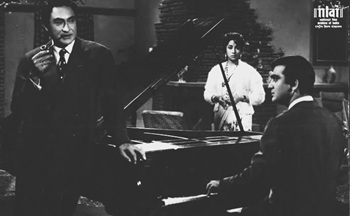 Gumrah was a different type of movie with BR Chopra’s stamp all over it. A lover (Sunil Dutt) is frustrated because his lady love (Mala Sinha) responds to the call of duty when her sister dies suddenly and marries her brother-in-law (Ashok Kumar) to care for her sister’s children. His attempts to win back her love, and her husband’s reaction are the grist of the film. All the actors, including Shashikala, who plays Ashok Kumar’s secretary, perform remarkably well. Ravi’s music and Sahir Ludhianvi’s lyrics add value to the film. Mahendra Kapoor’s solos, Aa bhi jaa, Aap Aaye and Chalo ekbar phirse, and Asha Bhonsle and Mahendra Kapoor’s duets, Aa jaa aa jaa re and Tujhko mera pyar pukare remain unforgettable. At the 1963 National Film Awards, Gumrah was declared the third best feature film in Hindi. At the Filmfare Awards in the same year, Shashikala won the Best Supporting Actress Award, and Mahendra Kapoor won the Award for best singer for Chalo ek bar phir se.
Gumrah was a different type of movie with BR Chopra’s stamp all over it. A lover (Sunil Dutt) is frustrated because his lady love (Mala Sinha) responds to the call of duty when her sister dies suddenly and marries her brother-in-law (Ashok Kumar) to care for her sister’s children. His attempts to win back her love, and her husband’s reaction are the grist of the film. All the actors, including Shashikala, who plays Ashok Kumar’s secretary, perform remarkably well. Ravi’s music and Sahir Ludhianvi’s lyrics add value to the film. Mahendra Kapoor’s solos, Aa bhi jaa, Aap Aaye and Chalo ekbar phirse, and Asha Bhonsle and Mahendra Kapoor’s duets, Aa jaa aa jaa re and Tujhko mera pyar pukare remain unforgettable. At the 1963 National Film Awards, Gumrah was declared the third best feature film in Hindi. At the Filmfare Awards in the same year, Shashikala won the Best Supporting Actress Award, and Mahendra Kapoor won the Award for best singer for Chalo ek bar phir se.
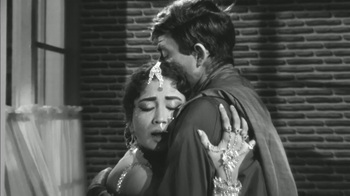 Dil Ek Mandir, directed by CV Sridhar, a heart-rending story of moral courage and devotion, was a remake of Sridhar’s Tamil hit Nenjil Or Aalayam. Sridhar completed the film in a record 27 days, despite the presence of three major stars of the era, Rajendra Kumar, Meena Kumari, and Raaj Kumar. Sridhar presents a seemingly familiar plot of a love triangle and a doctor's supreme sacrifice in the pursuit of his ideals with commendable zest and suspense. Sridhar is able to extract stunning performances from all actors. Shankar Jaikishan provided some haunting melodies like Mohammed Rafi's heart-tugging Yaad na jaaye beete dino ki. Lata Mangeshkar's haunting Ruk ja raat thehar ja re chanda and plaintive Hum tere pyar mein are my all-time favourites. Raaj Kumar won the Filmfare Award for Best Supporting Actor for the film. The film was also nominated for Best Movie, Best Director, Best Actor, and Best Actress but did not win these Awards.
Dil Ek Mandir, directed by CV Sridhar, a heart-rending story of moral courage and devotion, was a remake of Sridhar’s Tamil hit Nenjil Or Aalayam. Sridhar completed the film in a record 27 days, despite the presence of three major stars of the era, Rajendra Kumar, Meena Kumari, and Raaj Kumar. Sridhar presents a seemingly familiar plot of a love triangle and a doctor's supreme sacrifice in the pursuit of his ideals with commendable zest and suspense. Sridhar is able to extract stunning performances from all actors. Shankar Jaikishan provided some haunting melodies like Mohammed Rafi's heart-tugging Yaad na jaaye beete dino ki. Lata Mangeshkar's haunting Ruk ja raat thehar ja re chanda and plaintive Hum tere pyar mein are my all-time favourites. Raaj Kumar won the Filmfare Award for Best Supporting Actor for the film. The film was also nominated for Best Movie, Best Director, Best Actor, and Best Actress but did not win these Awards.
The Householder was the first collaboration between producer Ismail Merchant and director James Ivory, a documentary filmmaker until then. Based on a novel of the same name by Ruth Prawer Jhabvala, the film stars Shashi Kapoor and Leela Naidu. Ivory and Merchant were influenced by Satyajit Ray and sought his advice in making the film. The film was made in English as The Householder and in Hindi as Gharbaar. Going against the contemporary trend of using playback singing, the film used well known film songs like Chahe koi mujhe junglee kahe, Jiya ho jiya ho kuchh bol do, and pieces from Western classical music to puncuate episodes, leaving only one on screen bhajan Ram daras jab payo, tuned by Ustad Ali Akbar Khan.
Tere Ghar Ke Samne, written and directed by Vijay Anand, was the best romantic comedy produced by Dev Anand’s Navketan till then. It had no villains and no comedians. Yet, it entertained by the sheer force of the script, characters, music, and direction. Om Prakash and Harendranath Chattopadhyaya, as two feuding middle-aged fathers, provided humour with their dialogues and body language, as they throw ‘expletives’ like Aenak wale akhrot, Aaloo Bukhara, gutter gu, and pedha banaoonga at each other.
Charming Dev Anand, without his well-known mannerisms, thanks to Vijay Anand, and glamorous Nutan made a fabulous pair. SD Burman’s music was the icing on the cake with Mohammed Rafi’s solos Tu kahaan ye bata, Sunle tu dil ki sadaa and Dil ka bhanwar kare pukar, Lata Mangeshkar’s solo Ye tanhai haye re haye, and Mohammed Rafi and Lata Mangeshkar’s duets, Dekho rootha na karo and Tere ghar ke samne, staying alive till today. The orchestration for Dil ka bhanwar, partly shot in the Qutub Minar, is a tribute to the genius of SD Burman.
Aaj Aur Kal, directed by Vasant Joglekar, brought together Ashok Kumar and Sunil Dutt again in a film based on a Marathi play by PL Deshpande. The film related a topical story about changing times in India post-independence. An erstwhile Maharaja (Ashok Kumar) rules his mansion with an iron fist, denying his children their common pleasures, stifling them so much that his older daughter (Nanda) goes into depression and gets partially paralysed. The younger daughter (Shashikala), in love with a commoner (Sudhir) and sons (Deven Verma and Agha), live in fear. Relief comes in the form of a doctor (Sunil Dutt) employed to care for the ailing daughter. Things change with the doctor curing his patient and the Maharaja losing an election to his younger daughter’s boyfriend, who is also a local neta. Brilliant performances by all the leading actors, good direction, and good music by Ravi made the film worth watching. Mohammed Rafi’s solos Yeh wadiyan yeh fizayen bula rahin hain tumhe, Itni haseen itni jawan raat kya karen, and Asha Bhonsle’s solos Mujhe Gale Se Laga Lo and Maut Kitni Bhi Sangdil Ho are my favourites.
Ashok Kumar appeared in three more films, Bandini, Grahasti and Meri Surat Teri Aankhen, with different roles essaying them with his usual flair.
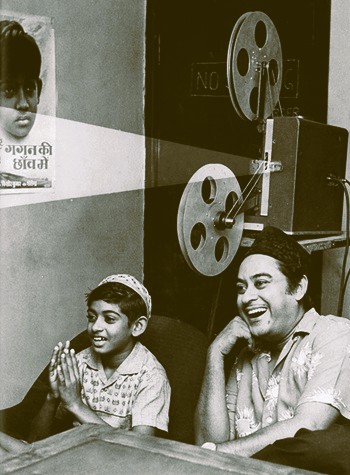 Door Gagan Ki Chhaon Mein was the first film produced by Kishore Kumar with a serious theme, curbing his natural bent for comedy. Once again, he used his multiple talents, including direction, mainly to save on production expenses. At this time Kishore Kumar was in a financial crisis. Acting assignments were drying up as his films Ek Raaz, Baghi Sipahi and Dal Mein Kala flopped. Meanwhile, medical expenses for his wife Madhubala’s treatment were mounting. The initial expenses for producing Door Gagan Ki Chhaon Mein were advanced by Kishore Kumar’s mother by mortgaging her jewellery. The film was inspired by the American film The Proud Rebel (1958), directed by Michael Curtiz, an Academy Award-winning director of Casablanca, one of the greatest films in cinema history.
Door Gagan Ki Chhaon Mein was the first film produced by Kishore Kumar with a serious theme, curbing his natural bent for comedy. Once again, he used his multiple talents, including direction, mainly to save on production expenses. At this time Kishore Kumar was in a financial crisis. Acting assignments were drying up as his films Ek Raaz, Baghi Sipahi and Dal Mein Kala flopped. Meanwhile, medical expenses for his wife Madhubala’s treatment were mounting. The initial expenses for producing Door Gagan Ki Chhaon Mein were advanced by Kishore Kumar’s mother by mortgaging her jewellery. The film was inspired by the American film The Proud Rebel (1958), directed by Michael Curtiz, an Academy Award-winning director of Casablanca, one of the greatest films in cinema history.
Shankar (Kishore) is a soldier who returns from war and finds that his house is burnt, his wife is dead, and his son Ramu (Amit Kumar) has lost his speech due to the shock. The film is about Shankar’s struggle to get his son cured. He is befriended by a rich woman, who helps him when he is injured in a scuffle with some evil men who threaten his son.
For the role of the son, Kishore Kumar held screen tests for many child artists who responded to ads. Kishore was not impressed with any of them. Kishore needed a boy who could communicate with his eyes, as the boy had to remain mute till the end of the movie. Iftekhar, who was playing a negative role and co-writing the script, suggested trying Amit for the son’s rule. They took a screen test and cast him, without his mother’s knowledge. In a rare coincidence, in Proud Rebel, the father and son roles were played by Alan Ladd and his son. Kishore Kumar did not want a busy Hindi film heroine for the role of the rich widow. Hemant Kumar suggested Bengali actress Supriya Devi, who was having a lean time after her successful performance in Meghe Dhaka Tara. Kishore Kumar, playing a melancholy character sans his trademark comedy acts, captivated us with his acting, singing, and direction of poignant scenes. When asked about his choice to make such a melancholic film, Kishore Kumar said, "There's sadness in the heart of even a comedian.” Amit filled his slot admirably, and so did Supriya Devi. Kishore Kumar created music in sync with the theme in some brilliant songs, all but one of them written by Shailendra. After the first song sitting, Shailendra abruptly walked out of the room, leaving Kishore Kumar perplexed. Shailendra went to the nearby seashore for inspiration and returned with the lines Koi lauta de mere beete hue din. Kishore Kumar was unable to pay Shailendra for his songs, giving evasive answers whenever he was asked. Shailendra was furious when he heard that Kishore Kumar had recorded another song, assuming that he had used another lyricist. Kishore Kumar told him that he had written it himself because he could not afford a lyricist. When Shailendra heard the song, he said, “If I were to write this song, I would have written it exactly like this.” Aa Chal Ke Tujhe, is perhaps the only Hindi film song written, composed, sung, enacted, directed, and produced by a single artist. The movie’s credits do not show Kishore Kumar as a lyricist , but the LP record of the film’s music has his name on it. Kishore Kumar plays down praise for writing lyrics. “I write only on the basis of tukbandi” he says, “Don’t compare me with the greats.” He started with Gagan ke tale, and he found words to rhyme with tale, like pale, khale, dhale, chale and worked out the remaining words around them. The sad and sentimental solo Raahi tu ruk mat jaana, sung by Hemant Kumar, accompanies the credits, with a backdrop of paintings by Iftekhar, who was a talented painter. Manna Dey sang the heart touching bhajan O jag ke rakhwale with Kishore Kumar. The refrain of Koi lauta de mere beete hue din was used in the dubbed version of Satyajit Ray’s Kapurush. Kishore Kumar sounds more like his inspiration, KL Saigal, particularly in Jin raaton ki bhor nahin hai.
Kishore Kumar had no exaggerated expectations of the success of his film. A few days before its release, he put an ad in The Screen with the message, ‘Kishore, who made you laugh, now turns serious and offers you the most unusual and moving tale of a boy who had lost the power of speech.’ Subodh Mukerji, who had booked Alankar Cinema in Bombay for eight weeks for his April Fool, offered Kishore one week out of the eight, saying “After all, the movie cannot run beyond a week.” “It can’t run beyond two days, forget pushing a week,” Kishore reassured him. The film started with an audience of ten people at Alankar, including Kishore Kumar. In a few days, word of mouth and the positive views of critics led to the ‘House Full’ board being hung in front of the theatre. The film ran for all eight weeks, leaving Subodh Mukerji pulling his hair. Kishore shifted the film to Super Cinema, where it ran for another twenty-one weeks. Door Gagan Ki Chhaon Mein received critical acclaim. Known for his acerbic pen, Baburao Patel, editor of Filmindia magazine, wrote that the film “just misses out on being a classic". The film was also applauded by the Hindi magazine Rangbhumi. But the film did not win any Awards. It is reported that Kishore Kumar was approached by officials of the I & B Ministry for bribes to enter the film for the National Film Awards, but Kishore Kumar refused to oblige.
10-May-2025
More by : Ramarao Annavarapu

|
Fantastic ! I love those old B & W hindi movies.. Purani yaadein... |

|
Another great episode.thnx.keep it up. |